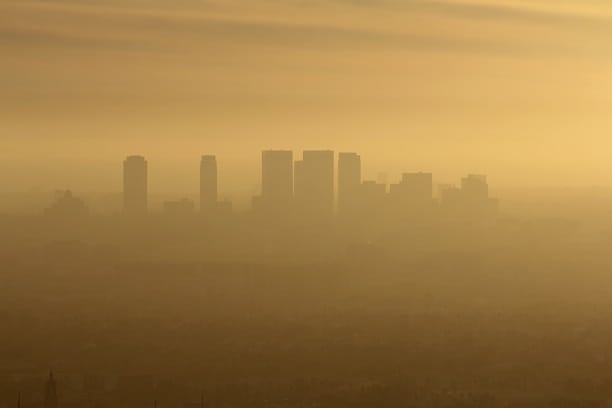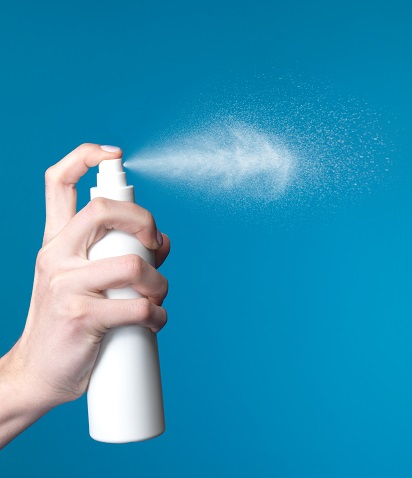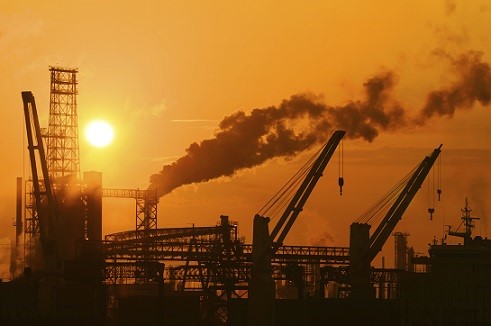 Air pollution has long been acknowledged as a public health menace. In countries like China, the industrial fumes from coal powered factories are so overwhelming that the average lifespan has plummeted by an estimated 5.5 years.
Air pollution has long been acknowledged as a public health menace. In countries like China, the industrial fumes from coal powered factories are so overwhelming that the average lifespan has plummeted by an estimated 5.5 years.
If you’re a Western expat living in developing cities like Bangkok, you have to wear a mask whenever you’re outside, or else develop the classic “gravel-throat voice”. You’ll end up sounding like Christian Bale in the recent Dark Knight trilogy.
It’s not just the third world; living in busy sections of London can increase your risk of lung cancer, inflammatory bowel disease, and even Alzheimer’s…
…and you might have guessed, by now, that air pollution is also a huge cause of acne.
Air pollution – constantly bombarding you with free radicals
 The first villain on our list is ozone, formed from the pollutant nitrogen dioxide.
The first villain on our list is ozone, formed from the pollutant nitrogen dioxide.
When cars burn petrol, the combustion process creates nitric oxide (NOx). This gas then reacts with oxygen in the atmosphere and morphs into nitrogen dioxide (NO2).
This gas, one of the key pollutants plaguing Beijing and industrial cities, is the classic lung-destroying chemical of air pollution. NO2 triggers asthma, bronchitis, and general respiratory weakness.
Worse though, is NO2’s power to morph into various other pollutants, and in particular, “volatile organic compounds”. This includes countless smaller toxic substances formed from burning coal, gasoline, paint, rubbish, factory chemicals, and more.
One volatile organic compound is the hydrocarbon, and when NO2 reacts with this villain, the pollutant ozone is formed. Ozone occurs naturally in the upper atmosphere, helping to block the strongest UV rays; hence why the whole world panicked about the hole in the ozone layer above Antarctica.
Read Annihilate Your Acne – get the ultimate diet for clear and glowing skin!
Nevertheless, in high concentrations at ground level, ozone can be deadly. The dreaded smog, master of suffocation and cancer, is the perfect visible example of ozone pollution.
With the roads in our cities packed with cars and vans, ozone might be the most ubiquitous pollutant around. Mexico City has the world’s highest concentrations, and in the US, Los Angeles, New York, Phoenix, Las Vegas, and Sacramento aren’t far behind (check this link for rates in American cities)…
…and that’s bad news for your skin, because ozone is a master at causing oxidative damage. Ozone isn’t a free radical itself, but it easily triggers free radical reactions in living organisms. Ozone snatches the electrons from the molecules of your skin cells, making them highly unstable and prone to collapse.
As for acne…
Firstly, ozone can oxidise sebum, the pore-clogging oil on your face. When a compound in sebum called squalene is exposed to free radicals, it forms squalene peroxide, which causes both a localised increase in sebum production and glues your dead skin cells together.
These combine for the perfect pore blocking recipe. We discuss regularly how sebum/squalene oxidation is a little known root cause of acne. Ozone is a major culprit behind it, alongside other pollutants like nitric oxide.
Secondly, ozone can worsen your skin’s overall appearance, creating a grey and unhealthy tone. Free radicals are why polluted city dwellers always age so quickly. Simply go on holiday to the Alps with their clean mountain air for a couple of weeks, and you’ll look like a whole new person.
Thirdly, an old 1997 study found that air pollution in urban areas, and particularly high ozone concretions, strongly depleted vitamin E levels in the stratum corneum, the outermost layer of the skin’s epidermis. The vitamin fell by 25% after just two hours of heavy air pollution exposure. From the study: “it was very striking how readily vitamin E was depleted.” After six consecutive days of similar exposure, only 25% of vitamin E survived.
Vitamin E is the body’s main fat-soluble antioxidant. But most importantly, it’s your skin’s main defensive antioxidant against sebum oxidation.
Thus, ozone becomes doubly potent at creating squalene peroxide. Vitamin E can also strengthen your skin cells against ultraviolet light, preventing all kinds of sun damage like sunburn, skin cancer, and most importantly, inflammation of existing pimples.
Why vitamin C is the acne nutrient you cannot ignore
Stockpiling vitamin E in the skin may be broadly anti-inflammatory too. In studies, it inhibits interleukin, COX-2, and prostaglandin production (all powerful immune system chemicals), and calms inflammatory conditions like eczema, edema, and erythema. The advantage? Acne is an inflammatory disease at its root.
Finally, free radicals can weaken your skin’s collagen structures. It also morphs newly manufactured collagen into unusable forms. Damaging collagen is how free radicals unleash most of their ageing mischief. Collagen is the youthfulness protein, but also a big player in wound healing and the fading away of old acne.
Of course, ozone is only the main free radical-generating pollutant. There are plenty more lurking in cities and alleyways with identical skin-wrecking effects, including manmade nitric oxide, hydrocarbons, and other volatile organic compounds. According to one estimate, a smoker is exposed to 300 times more free radicals from air pollution than their cigarettes.
Particulates – another inflammatory villain
Meanwhile, the second big acne danger of air pollution is digestive inflammation, and a chief culprit is particulate matter, one of the most scientifically studied forms of air pollution. It’s common in cities worldwide, and made up of extremely small solid particles or liquid droplets. Particulate matter can contain any number of toxins, including soil, organic chemicals, metals, or dust.
Fine particulate matter, meanwhile, is officially defined as particles equal to or less than 2.5 micrometers. Sources are everywhere; smoke from chimneys and forest fires, gases emitted from power plants, industries, and in particular, automobiles, particularly those with cheap and impure fuel.
Important article – the top 6 vitamins and minerals for clearing acne
The lower the diameter, the worse for your health. The US Environmental Protection Agency (EPA) considers any particulates less than 10 micrometers to be toxic. Tiny particles can easily pass through tightly regulated bodily membranes and into your lungs, causing breathing problems, and into the heart.
Importantly for acne, particulates slip easily into your intestines – your digestive system.
Basically, when you breathe in particulates, they first get stuck to the mucus of your respiratory tract. This mucus is ultimately digested in your small intestines – and the fine particulate matter arrives there with it.
Your body gets completely confused: small by-products of coal and wood burning make no sense to it. Thus, your immune system automatically unleashes a large inflammatory response.
This causes collateral damage to your gut lining, weakening its semipermeable membrane. The result? A condition called leaky gut syndrome.
Normally, the human gut only absorbs beneficial substances from food – vitamins, minerals, phytonutrients, and proteins. Meanwhile, damaged proteins, unhealthy bacteria and viruses, and random inflammatory compounds are rejected. It’s a tightly regulated system.
Leaky gut syndrome is when those unwanted substances do pass through, in a steady uncontrolled stream. They’re simply not designed to enter your bloodstream, and many are dangerous in their own right; agrochemicals from produce, viruses, natural plant toxins.
Hence, your body lazily defaults to an immune system assault again. With so many intruders, this cranks up your entire body’s burden of chronic inflammation, one of the two main root causes of acne.
As for particulates? This study on mice found that breathing particulate matter weakened epithelial cells (which form the lining of your gut), disrupted tight junction proteins (which open and close to allow nutrients passage), and generally increased intestinal permeability. The mice also had more inflammatory chemicals like interleukin 6 in their guts.
Furthermore, because fine particulate matter has such a tiny diameter, it can even pass through a healthy gut lining. Air pollution can fuel the fires of inflammation in any circumstances.
A weakened gut lining can heal with time, but with continuous exposure to particulates, that process cannot begin.
It’s not a bygone, Victorian era problem. According to the American Lung Association, over 44 million US citizens live in areas exceeding federal health standards for fine particulates. Los Angeles, Pittsburgh, Cleveland, El Paso, Phoenix are particularly notorious.
That said, particulates are the tip of the iceberg. Nowadays, ever more studies are linking digestive problems to air pollution of all kinds.
In 2002, high air pollution levels were associated with a 40 percent increase in bowel disease hospitalizations in Wisconsin (study). Chemicals accounted for included carbon monoxide, sulphur dioxide, nitrous oxide, volatile organic chemicals and fine particulate matter.
Important article – the top 7 natural topical treatments for acne
Another study found that with higher exposure to nitrogen dioxide, British people aged between 5 and 23 were over twice as likely to develop Crohn’s disease. This illness has similarities with leaky gut syndrome, as the root cause is an overactive inflammatory response.
The conclusion is clear: most air pollution is bad news for your digestive system, and bad news for your skin too.
Air pollution is an underestimated cause of acne
 Air pollution has many indirect consequences as well. Particulates can block UV rays, and consequently, it’s much harder to make enough vitamin D while living in a city. Some of the chemicals inflame your skin directly, and the digestive havoc can make important nutrients less absorbed, like zinc and magnesium.
Air pollution has many indirect consequences as well. Particulates can block UV rays, and consequently, it’s much harder to make enough vitamin D while living in a city. Some of the chemicals inflame your skin directly, and the digestive havoc can make important nutrients less absorbed, like zinc and magnesium.
If you live in a busy city, then air pollution is likely a significant cause of your acne.
I’ve noticed the effects vividly while on holiday. Whenever I spend a week in Austria for a skiing or mountaineering holiday, I nearly always notice a fresh burst of glow and radiance after approximately three or four days. I don’t get any pimples at all. When I’m there, I usually relax and bombard my body with greasy frankfurters and fries, rustic Austrian bread (made with wheat, an acne nightmare) and sugary Schokoladetorte.
Somehow though, my skin never seems to deteriorate. Back when I used chemical face washes, I found it interesting that the cotton puff I wiped my face with was always covered in far less grime and dirt afterwards compared to in England.
From my experiences, there’s no question that clean mountain air is a godsend for your skin. Basic village air is far better too.
But what can I do about it?
Firstly, if you’re considering moving, then you should factor the quality of the air into your decision.
Rural areas are nearly always cleaner. However, moving house just to clear your skin clearly isn’t an option for most people. Leaving the window open will bring in fresh air in a village, but city air will actually be worse than your inside air.
Therefore, if you live in a highly polluted area, it’s far smarter to boost the air quality inside your home. You can create a sanctuary of pure, acne-friendly air. Domestic air is usually quite polluted itself, but freshening it up is easy.
Here’s a guide to get you started:
Replace chemical based products – deodorants, scented candles, air fresheners, and perfumes are loaded with inflammatory chemicals like phthalates and parabens. If you spray them every day, the fumes will build up in your house and so will the chemicals. Search for natural alternatives instead.
Avoid non-stick cookware – during hot cooking, Teflon releases several chemicals directly into the air. These include PFIB, a chemical warfare agent favoured by dictators everywhere.
Buy natural cleaning products – instead of chemical cleaners, try using recipes on the internet with vinegar, lemon juice, baking soda, hydrogen peroxide, or Dr Bronner’s liquid castile soap. With almost monthly exposures of formerly “safe” chemicals, there’s tons of recipes available.
Buy house plants – when you walk into a flowery meadow, you immediately notice how pleasant the air is to breathe. Many plants species can remove toxins from the air, and the same applies to your house. Air-freshening house plants include species of ivy, like English Ivy, Devil’s Ivy, and Parlor Ivy. Just about any plant will do; basic flowers from the grocery store will help, as will raising a colony of spider plants. In fact, the more the better. You could make your air unbelievably fresh and pleasant.
Hoover regularly – household dust isn’t just dead skin, it’s often loaded with chemicals like phthalates. Additionally, fine dust or powders, including talcum powder, can cause similar inflammation to particulates. They linger in the air after usage as well.
Don’t smoke inside – it’s best not to smoke at all, but stop doing it inside, and you can at least prevent the build-up of free radicals and other contaminants.
Conclusion
Air pollution is one of the worst hidden acne villains which people rarely discuss. Its specialities are inflammation and massive free radical damage.
Yes, if you live in a polluted city, you’ll always be exposed to more inflammatory contaminants, but the steps above can make a good difference.
If you can’t move, then it’s doubly important to work hard in other areas. For example, cutting your cigarette intake (preferably to zero) will actually save you money. Taking vitamin D will make up for the reduced UV light exposure.
It’s also smart to arrange your daily face washes to minimise the contact of pollutants with your skin. You should wash your face with cool water and natural soap the second you get in from work or shopping, to remove any particulates as fast as possible.
If your hometown isn’t polluted, then this article might explain why your acne worsens during a trip to the big city.
NEXT: learn the root causes of acne, clear your skin permanently
Thanks for reading!

Hi Richard,
The only thing that has work for me was relocating. The village air as you mention was a godsend for my skin. I would also eat the wrong foods, without consequence. I still had oily skin, but nothing extreme. Who cares right, if you’re not breaking out? I have read the benefits of having oily skin, when it comes to aging so this was like an ideal scenario.
Having to relocate again to a polluted city, has once again made my skin spiral out of control. I feel like I am in a losing battle when it comes to fighting acne with all these pollutants roaming around. I mean i can improve the air quality inside inside my home, but won’t all my work just come undone as soon as I leave the house?
I guess the only thing to do is binge on blueberries when they are in season and other antioxidants. I have recently started applying topical antioxidants as well such as green tea.
The thought of relocating permanently for the sake of your skin sounds very bold, but I have to admit, It is a thought that has crossed my mind.
Anyway keep posting
Yours truly
Theo
I really doubt humans’ intelligence sometimes. Don’t they realise what a major, major problem cars have become?
Ever heard of electric cars and cars that run on alternative clean fuels? You’re talking as if people still happily fuel cars with leaded petrol lol
Electric cars still produce pollution indirectly from coal fired power stations. Unless that is the energy comes from solar panels and their output vary every day according to cloud clover.
Besides, they’re so expensive and burdensome to charge; hardly anyone uses them anyway. Ever heard of a bicycle before?
Do you think it is worth investing in an air filter for indoors? Also important not to use gas stoves which emit all kinds of noxious gases into the air.
It’s a good idea if you have the money, and depending exactly on your local pollution levels. Even though we’re far from the smog filled days of 1800s London, and most western cities aren’t as bad as Beijing for example, there are new stories almost monthly about health conditions from people in high air pollution zones. For purely acne I would always recommend prioritising the basics like vitamin E and zinc if your cash is limited, but air pollution affects so much else as well.
Hi. Are airborne bacterial plumes from flushing toilets an issue? Unless we clean religiously everywhere, the overall bacterial load can potentially increase significantly throughout the entire home.
I wouldn’t worry about every last trace of bacteria. Like you said, it’s impossible to clean religiously everywhere. We do have our immune systems for a reason, you know.